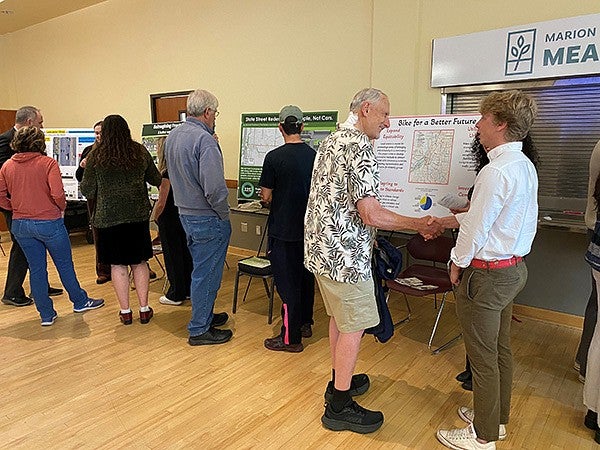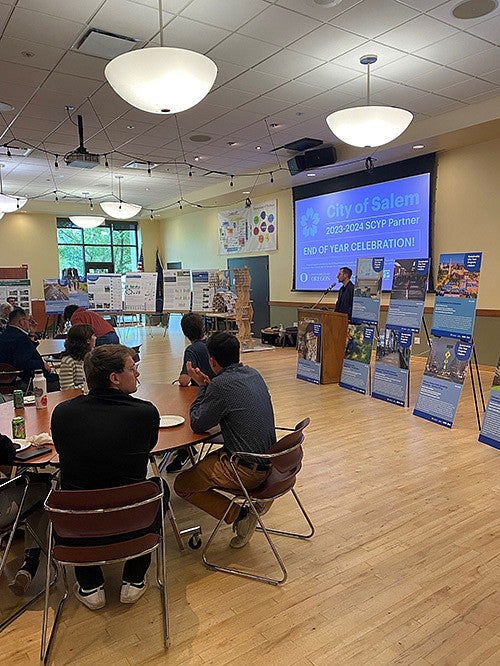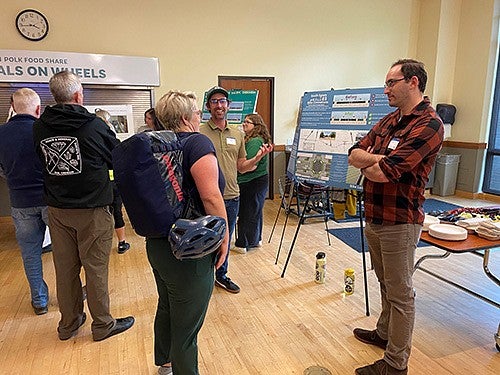
On a Tuesday afternoon at Center 50+ in Salem, community members and stakeholders of all ages came together to celebrate the end of another Sustainable City Year Program (SCYP) service year. The fourteenth year's partner is a special one, as the City of Salem returns to the program. The city was one of the first partners for the nascent SCYP back in 2010–11 and returned with the goal to go further and faster than they could on their own, courtesy of the innovative faculty and students.
The End of Year Celebration on Tuesday saw university, state, and city leadership come together to learn about faculty and student work from over 20 courses directed at high priority projects for City Council and the Salem community. Students and faculty studied and made recommendations in SCYP courses that included journalism, architecture, landscape architecture, geography, nonprofit management, planning, public administration, and Portland State University engineering. Final reports from each class will continue to be added and are made available to the public. The excitement from the stakeholders in attendance was palpable, as community members interacted with students and speakers talked about the successful outcomes of each class project.
“This is such a great partnership between the city and the University of Oregon,” said Salem Mayor Chris Hoy. “The ideas and collaboration these students bring to the city are instrumental in helping us tackle a variety of local problems. To see the energy and excitement of projects is really remarkable.”

To kick off the event, a poster session of final projects from two spring courses, Topics in Bicycle Transportation and Equitable Urban Parks, occurred for the community to interact and ask questions regarding the student’s work. Formal remarks featured speakers from both entities, including Salem staff, UO faculty, and students highlighting each project, proposed recommendations, and outcomes. Following formal remarks, attendees had the opportunity to connect with UO faculty and students in an open house format to learn more about how the courses will help create long-term value for the Salem community.
“Students provide excitement, energy, and innovation,” said Salem resident and University of Oregon senior Sulwyn De Crouzuc. “A year of SCYP classes is going to be extremely beneficial for City staff to have access to a wide range of potential solutions and new ways of thinking about complex community issues.”
This SCYP and City of Salem partnership is possible, in part, with support from U.S. Senators Ron Wyden and Jeff Merkley, as well as former Congressman Peter DeFazio, who secured federal funding in FY23 for SCYP through Congressionally Directed Spending and the US Department of Education. With additional matching funds from the City of Salem, the partnership allowed UO students and faculty to study and make recommendations on city-identified projects and issues.
“UO’s SCYP is a proven model of success, using the drive and expertise of students and faculty to discover solutions that move Oregon communities to a clean energy future faster,” Senator Jeff Merkley said. “The entire Salem community will continue to benefit from being an idea-sharing hub over the past school year that provided students with tangible, real-world learning opportunities to make the city more sustainable and resilient to climate chaos.”

The mutually advantageous work that is undertaken by students and faculty at the university under the SCYP umbrella helps our local communities address hardships and local issues with access to resources that might not be available. The university course gets matched with the needs of an Oregon city creating a unique, experiential educational opportunity that will prepare students for entry into the workforce while helping create a more positive and sustainable future for our local community. This model has been a proven success for Oregon for the past fourteen years and helps communities adopt solutions quickly, thanks to the help of the student and faculty participants.
“SCYP starts with community needs first. If we provide value to communities, we know students are learning and do incredible work when they’re asked to help,” explained Professor Marc Schlossberg. “A lot of magic happens and that’s what we’re here to celebrate.”
